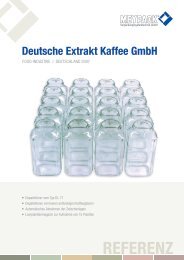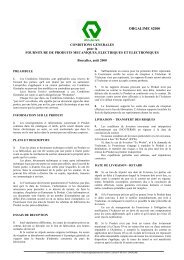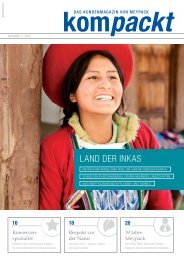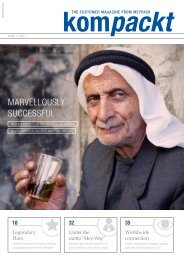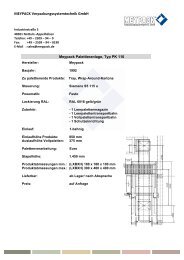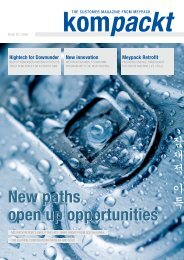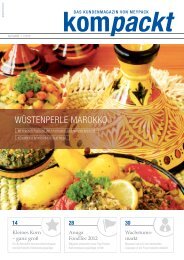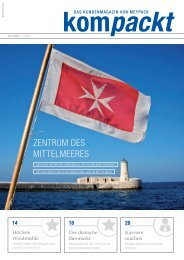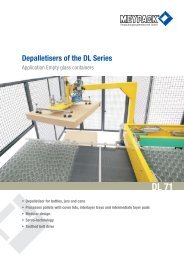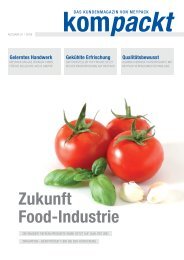Create successful ePaper yourself
Turn your PDF publications into a flip-book with our unique Google optimized e-Paper software.
<strong>of</strong> pressure. With this “tray-lid”-application, <strong>the</strong> lid<br />
is positioned inside <strong>the</strong> tray and depending upon<br />
<strong>the</strong> customer’s wishes, can simply be inserted or<br />
secured additionally with adhesive. The machine is<br />
equipped with motorised adjustment points, which<br />
enable <strong>the</strong> machine to be automatically changedover<br />
within an extremely short time and ensure<br />
that <strong>the</strong> format settings remain unchanged.<br />
WHITE CHEESE OR FETA CHEESE – THAT IS THE<br />
BIG QUESTION<br />
Feta has its origins as a cheese produced and<br />
stored in salt brine. That means that in <strong>the</strong> process<br />
<strong>of</strong> producing <strong>the</strong> sheep’s milk cheese (sometimes<br />
goat’s milk cheese), <strong>the</strong> whey (<strong>the</strong> watery part <strong>of</strong><br />
<strong>the</strong> milk) is separated without pressure from <strong>the</strong><br />
curd (cheese), which ripens in a salt brine. This also<br />
bestows <strong>the</strong> feta cheese with its typical, intensive<br />
taste. Up until <strong>the</strong> year 2007, similar types <strong>of</strong> cheese<br />
from o<strong>the</strong>r countries were being sold as “feta” in<br />
<strong>the</strong> European Union, even though <strong>the</strong> majority were<br />
produced from cow’s milk. According to a decision<br />
handed down by <strong>the</strong> European Commission, only<br />
white cheese produced in Greece from sheep’s milk<br />
or goat’s milk and ripened in salt brine is allowed<br />
to carry <strong>the</strong> name feta.<br />
Feta enjoys a long tradition in Greece. Since time<br />
immemorial, feta has been considered a delicacy<br />
and a coveted item <strong>of</strong> trade, not <strong>the</strong> least because<br />
Protected from all sides: VP 453 packs white cheese in trays with lids<br />
it has been touted as an aphrodisiac with strength<br />
enhancing characteristics. Feta has also been used<br />
as an <strong>of</strong>fering to <strong>the</strong> gods. The art <strong>of</strong> producing<br />
cheese was built up and refi ned by Roman slaves.<br />
The Romans developed a large array <strong>of</strong> baked<br />
goods containing cheese and diverse variations <strong>of</strong><br />
cheese salads. Even <strong>the</strong> Roman legionnaires carried<br />
feta cheese along with olives, bread and raisins as<br />
provisions in <strong>the</strong>ir fi eld packs.<br />
Since <strong>the</strong> 19th Century and particularly in<br />
Europe, cheese production has been subject to<br />
scientifi c research and innovation, especially to<br />
improve <strong>the</strong> shelf life <strong>of</strong> cheese. Often in close<br />
cooperation with cheese craftsmen, engineers have<br />
developed cutting frames, beaters, curd separators,<br />
electrical cutting devices and agitators, huge vats<br />
and boilers, cooling units and o<strong>the</strong>r aids used in<br />
producing cheese at industrial capacity.<br />
CONVENIENT AND PRACTICAL – MEYPACK’S<br />
“WASH-DOWN” CONCEPT FOR SIMPLE CLEANING<br />
It goes without saying that especially in <strong>the</strong><br />
dairy industry, <strong>the</strong> purity <strong>of</strong> <strong>the</strong> entire production,<br />
fi lling and packaging line plays an immensely<br />
important role. In order to cope with <strong>the</strong> regularly<br />
scheduled cleaning processes, <strong>the</strong> <strong>Meypack</strong> packaging<br />
machine was produced in a “wash-down”<br />
version. This means that bearings and guides<br />
have been built <strong>of</strong> rust-free stainless steel and <strong>the</strong><br />
hot-melt applicator has been equipped with special<br />
hose connections and nozzles that are protected<br />
from water spray. This technically sophisticated<br />
packaging machine has been rounded out with a<br />
high capacity ZM 600 magazine for <strong>the</strong> tray and lid<br />
blanks.<br />
<strong>Meypack</strong> Representative Denmark:<br />
Weimar Nicolaisen A/S<br />
Hjulmagervej 11 A<br />
7100 Vejle<br />
Denmark<br />
Tel.: +45 (0) 3886 - 3533<br />
Fax: +45 (0) 3886 - 1606<br />
info@weimar-nicolaisen.dk<br />
www.weimar-nicolaisen.dk<br />
Contact person: Briand Andersen



